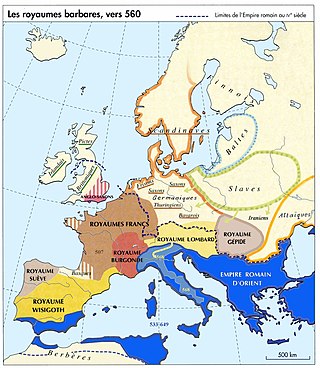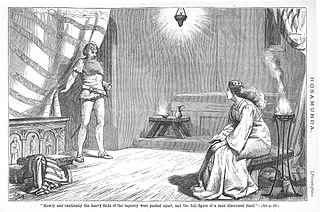Related Research Articles

Alboin was king of the Lombards from about 560 until 572. During his reign the Lombards ended their migrations by settling in Italy, the northern part of which Alboin conquered between 569 and 572. He had a lasting effect on Italy and the Pannonian Basin; in the former, his invasion marked the beginning of centuries of Lombard rule, and in the latter, his defeat of the Gepids and his departure from Pannonia ended the dominance there of the Germanic peoples.

The Lombards or Longobards were a Germanic people who conquered most of the Italian Peninsula between 568 and 774.
The 560s decade ran from January 1, 560, to December 31, 569.
Year 560 (DLX) was a leap year starting on Thursday of the Julian calendar. The denomination 560 for this year has been used since the early medieval period, when the Anno Domini calendar era became the prevalent method in Europe for naming years.

Year 565 (DLXV) was a common year starting on Thursday of the Julian calendar. The denomination 565 for this year has been used since the early medieval period, when the Anno Domini calendar era became the prevalent method in Europe for naming years.
566 (DLXVI) was a common year starting on Friday of the Julian calendar. The denomination 566 for this year has been used since the early medieval period, when the Anno Domini calendar era became the prevalent method in Europe for naming years.

The Gepids were an East Germanic tribe who lived in the area of modern Romania, Hungary, and Serbia, roughly between the Tisza, Sava, and Carpathian Mountains. They were said to share the religion and language of the Goths and Vandals.
Bayan I reigned as the first khagan of the Avar Khaganate between 562 and 602.

Alduin was king of the Lombards from 547 to 560.

Cunimund was the last king of the Gepids, falling in the Lombard–Gepid War (567) against the Lombards and Pannonian Avars.
Chlothsind was a Frankish princess and the queen consort of the Lombard king Alboin. Her name may also be spelled Chlothsinda, Chlodosinda, Chlodosind, Chlodoswintha or Chlodosuinth.
Albsuinda was the only child of Alboin, King of the Lombards in Pannonia, and his first wife Chlothsind, daughter of the Merovingian king of the Franks Chlothar. While still young Albsuinda had lost her mother shortly before the final clash in 567 with the people of the Gepids in Pannonia, in which the Gepids were completely destroyed. After the victory her father had promptly remarried, taking as second wife Rosamund, daughter of the Gepid king Cunimund that Alboin had personally killed on the battlefield.

Rosamund was a Lombard queen. She was the daughter of Cunimund, king of the Gepids, and wife of Alboin, king of the Lombards.
Rodelinda (6th-century), was a Lombard queen by marriage to king Audoin, and mother of king Alboin.

Helmichis was a Lombard noble who killed his king, Alboin, in 572 and unsuccessfully attempted to usurp his throne. Alboin's queen, Rosamund, supported or at least did not oppose Helmichis' plan to remove the king, and after the assassination Helmichis married her. The assassination was assisted by Peredeo, the king's chamber-guard, who in some sources becomes the material executer of the murder. Helmichis is first mentioned by the contemporary chronicler Marius of Avenches, but the most detailed account of his endeavours derives from Paul the Deacon's late 8th-century Historia Langobardorum.
Thurisind was king of the Gepids, an East Germanic Gothic people, from c. 548 to 560. He was the penultimate Gepid king, and succeeded King Elemund by staging a coup d'état and forcing the king's son into exile. Thurisind's kingdom, known as Gepidia, was located in Central Europe and had its centre in Sirmium, a former Roman city on the Sava River.
Baduarius was an East Roman aristocrat, the son-in-law of Byzantine emperor Justin II. Theophanes the Confessor erroneously calls him a brother of the Emperor.
Elemund was king of the Gepids, an east Germanic people, during the first half of the 6th century. He may have been the son of Gunderit, himself son of Ardaric ascended by overthrowing a rival Ardariking branch. Based on archaeological evidence, István Boná believes that in the 520s or 530s Elemund must have consolidated his power in Transylvania by submitting or removing minor Gepid rulers. Elemund had a son and daughter, Ostrogotha and Austrigusa, respectively; the latter was given in marriage to Wacho, the king of the Lombards, in 512. The reasons behind the marriage were multiple: on one side it protected the two kings from the threat represented by the Ostrogothic Kingdom, while on the other it reduced the danger represented to the Lombard king by Ildechis, a pretender to the Lombard throne. Wacho was eventually to remarry after Austrigusa's death, but this did not compromise the good relations existing between Lombards and Gepids. Elemund died of illness in 548 and was succeeded by Thurisind, while the legitimate heir was forced into exile. Ostrogotha found hospitality among the Lombards, but was killed in 552 by his host, King Audoin, as part of a plan to ease relations between Gepids and Lombards.

In 566, Lombard king Alboin concluded a treaty with the Pannonian Avars, to whom he promised the Gepids' land if they defeated them. The Gepids were destroyed by the Avars and the Lombards in 567. Gepid King Cunimund was killed by Alboin himself. The Avars subsequently occupied "Gepidia", forming the Avar Khaganate. The Byzantine Emperor intervened and took control of Sirmium, also giving refuge to Gepid leader Usdibad, although the rest of Gepidia was taken by the Avars. Gepid military strength was significantly reduced; according to H. Schutz (2001) many of them joined Lombard ranks, while the rest took to Constantinople. According to R. Collins (2010) the remnants were absorbed either by the Avars or Lombards. Although later Lombard sources claim they had a central role in this war, it is clear from contemporary Byzantine sources that the Avars had the principal role. The Gepids disappeared and the Avars took their place as a Byzantine threat. The Lombards disliked their new neighbours and decided to leave for Italy, forming the Kingdom of the Lombards.
Usdibad was a Gepid military commander (dux) and fugitive that received refuge by Byzantine Emperor Justin II during the Lombard–Gepid War (567).
References
- Ausenda, Giorgio. "Current issues and future directions in the study of Franks and Alamanni in the Merovingian period", Franks and Alamanni in the Merovingian Period: An Ethnographic Perspective. Ian Wood (ed.). Woodbridge: Boydell, 1998, pp. 371 – 455. ISBN 1-84383-035-3.
- (in French) Bóna, István. A l'aube du Moyen Age: Gépides et Lombards dans le bassin des Carpates. Budapest: Corvina Press, 1974 [1976], ISBN 963-13-4494-0.
- Gasparri, Stefano. "Kingship rituals and ideology in Lombard Italy", Rituals of Power: From Late Antiquity to the Early Middle Ages. Frans Theuws and Janet L. Nelson (eds.). Leiden: Brill, 2000, pp. 95 – 114. ISBN 90-04-10902-1.
- Goffart, Walter. The Narrators of Barbarian History (A.D. 550 – 800): Jordanes, Gregory of Tours, Bede, and Paul the Deacon. Princeton: Princeton University Press, 1988, ISBN 0-691-05514-9.
- Huizinga, Johan. Homo Ludens: A Study of the Play-Element in Culture . New York: Routledge, 1938 [1998], ISBN 0-415-17594-1.
- Jarnut, Jörg (1995) [1982]. Storia dei Longobardi (in Italian). Translated by Guglielmotti, Paola. Torino: Einaudi. ISBN 88-06-13658-5.
- Martindale, John R. (ed.), Prosopography of the Later Roman Empire - Volume III: A.D. 527 – 641 , Cambridge: Cambridge University Press, 1992, ISBN 978-0-521-20160-5.